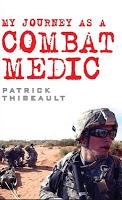There is a duality of man. This duality is best explained by looking at a medic or a chaplain in the military. The chaplain’s job is to save souls and the medic’s job is to save lives. Both hate to see the destruction of humanity, yet both belong to an organization that excels at destroying humanity. -- from My Journey as a Combat Medic
 While I've never had a special interest in the military, I appreciate the chance to read and review well crafted memoirs by soldiers who have served in war. For me, a book like this is an important piece of living history. It's also a chance to vicariously experience a soldier's life in a way that is neither romanticized nor reconfigured to deliver a heavy "war is hell" message. It's simply an honest story of wartime experiences, conveying the horrors of war along with myriad acts of courage and compassion and other achievements.
While I've never had a special interest in the military, I appreciate the chance to read and review well crafted memoirs by soldiers who have served in war. For me, a book like this is an important piece of living history. It's also a chance to vicariously experience a soldier's life in a way that is neither romanticized nor reconfigured to deliver a heavy "war is hell" message. It's simply an honest story of wartime experiences, conveying the horrors of war along with myriad acts of courage and compassion and other achievements.Raised as an "army brat," Patrick Thibeault enlisted in the Army after graduating from high school and became a paratrooper and combat medic. In 1990, he was deployed to Operation Desert Shield, and he served in Iraq through Desert Storm. Later he served as a soldier and medic in Afghanistan. My Journey as a Combat Medic: From Desert Storm to Operation Enduring Freedom is his memoir about his experiences. Please see my interview with the author, which conveys the spirit of this book better than I could.
Thibeault writes in a vivid, engaging style that will appeal to a variety of readers including those, like me, who have no military experience. From taking his first jump as a paratrooper, to the ups and downs of military training, to providing medical care to soldiers, civilians, and prisoners of war, he brings his experiences to life. Reading this book, I could feel the heat of the desert and the weight of body armor and smell the aroma of spent ammunition, burnt flesh, and helicopter exhaust.
I appreciate this author's honesty, compassion, humility, and dry sense of humor. The stories he shares are raw and real, in many ways, but tempered with humor.
The Iraqi Army started setting the oil wells in Kuwait on fire before they left the country. When we flew into Kuwait, the burning oil wells were in our flight path. It looked like Armageddon. We were some safe distance above the oil wells, but it was hot – the hottest that I have ever been in my life. The flight suits and body armor were hot enough on their own, let alone coupled with burning oil wells. The unit established an forward operating base in Kuwait City at the airport. The area we were at was pretty secure; there were still a few enemy soldiers around, but most of them had surrendered, escaped, or been killed. The unit was split between the FOB in Kuwait and the hangars in Saudi Arabia. It was austere living at its finest: we had a gas generator for electricity; the cooks in our unit made us a hot breakfast and a hot dinner; and we had one of the packaged MREs for lunch. Some soldiers called them “Meals Rejected by Ethiopians,” as they all started to taste the same after a few months.This author offers glimpses of Afghanistan's culture and his experiences living and working closely with the Afghani people. He also shares many of the frustrations of wartime service, which most of us have gleaned only from the media, including having inadequate equipment and supplies.
One of the most interesting parts of this book, for me, was the author's discussion of post-traumatic stress disorder. He writes openly of his own struggle with PTSD -- including rage, flashbacks, and nightmares -- and discusses the challenges this poses and which strategies have been helpful for him. I appreciate the author's having the courage to explore this part of his journey.
I highly recommend this book, which works on many levels. It is an interesting memoir and an important first-person account of modern history. It also illuminates -- in a way that is honest and unsentimental without being negative -- the experiences of men and women in military service who, along with their families, have borne sacrifices for the rest of us.
